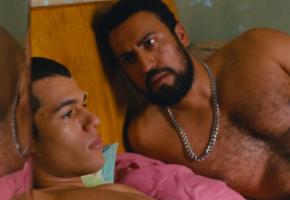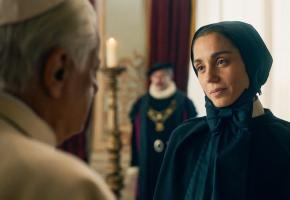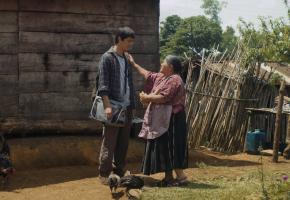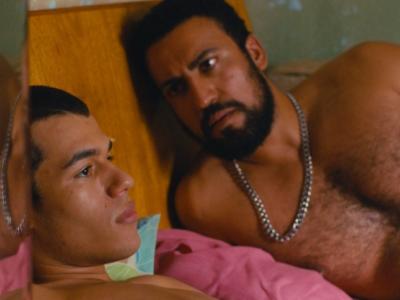Initially, Paula Hernández started out planning a different sort of career with hopes of being a writer with no thoughts of being in the film business: -
“I began to work in film when I was 19 years old. I was studying Communications at the University and at the same time, I was studying theatre and I loved writing. I wasn’t at all sure which way I was going to go, so I began working as a translator on a film by British director Anthony Pratt who lives in England. As a result, I began to understand that I could [feasibly]end up in the world of film. I left my studies and went to film school to take a Screenwriting course. It didn’t take long before I understood that my path would take me towards directing… even if I started out working in different areas.”
Filmed in Argentina at the turn of the millennium, her ópera prima ‘Herencia’ (Inheritance 2001) started the festival rounds in 2001, just as the financial crisis ‘El Corralito’ hit her country with a vengeance. Argentina was heavily indebted and bogged down by a stagnated economy in deep recession, with its currency artificially pegged to the US dollar. The Minister of Economy, Domingo Cavallo had to introduce severe measures to control a frantic run on the banks as people feared a total crash.
The Spanish word ‘corralito’ is the diminutive form for ‘corral’, or ‘enclosure’, to describe how accounts were frozen and no one could move more than a small allotted amount of money from the banks for one year, or none at all, from US dollar denominated accounts. To try to market a film in these conditions was a nightmare. The producer, Rolo Azpeitía, was unable to promote the production as he would have liked. Despite this, the film is so endearing that it has had a phenomenal success all the same, in particular in its home country and was garlanded with awards at international film festivals.

Peter Witzke and Rita Cortese in 'Herencia'
Hernández:
“The film had a huge impact, far beyond the actual story that the film was relating … which was also relevant… the subject matter being very closely linked to what was going on at that moment in Argentina. People were having to leave the country and many were having to analyse the possibilities of how to remain. People then saw how the character of Peter the German, in the movie, took a decision to stay and it gave the film a good ‘star’ to follow. It was my debut film and I have always believed that ópera primas always have something new that emerges from a different eye.”
There is a poignant personal connection to the tale: -
“I started to write ‘Herencia’ shortly after my grandmother [Ernesta] died and I was missing her a lot. There are many aspects of Olinda’s character that reminded me of her universe that, we could say, was very different to that of my mothers. I could say that I started thinking about her and writing things about her. There are many things about my Grandmother that I will never know because … she hardly spoke about her own history… so that gave me the possibility to invent a story about all the things she never said.”
No Engish Subtitles
‘Herencia’ is the warm, humorous story of two very different individuals who meet up, somewhat accidentally and find they have more in common than expected. Olinda (the superb Rita Cortese) runs a local eatery, cooking her home-made Italian specialities with great gusto and much bickering and complaining. However, everyone knows that behind her sharp tongue is a huge heart and she is surrounded by people who care for her, especially the ever-patient Federico (Martín Adjemián) who dotes on her. Even her assistant chef and waiter, Ángel (Héctor Anglada) who is the unfortunate target of most of her impatience, is permanently resigning, every evening, but still returning faithfully the following morning for more. When a young German, Peter (Adrian Witzke) comes to Buenos Aires searching in vain for a woman he loves, he literally bumps into Olinda, who despite complaining bitterly, cannot stop herself from helping him out. It is not a coincidence that these two people can relate, Olinda had also arrived in Buenos Aires to join a love that did not work out. Painful memories are revisited and shared and a new road is carved out that suits them all.
Hernández, being not only the director but also the writer, gets very close to her characters and betrays a sensitivity to the inner, intimate and private existential lives she has created. As a result, the dynamics and quality of the dialogue takes on a great importance, and in this Hernández excels: -
“Dialogues are very important for me … especially in the scripts. I try to fine-tune the scripts as much as possible before we begin the shoots. On the whole, there are a lot of re-writes, in particular with dialogues as it’s important for me to work on the readings with the actors, because as a result of that something truthful emerges, it transforms itself from being literary prose to becoming something else, and that work, many times, has to be fine-tuned from those readings and the ease with which the actors can say those words, so as to maintains an organic feel, so that it can be successful.”
Hernández is not one for improvisation, despite the free feel of her productions. Some improvisations take place during rehearsals, or in the initial readings of the scenes [with the actors], in working through certain ideas with them, that helps her to ‘sharpen her pencil’.
“In the end, this is a job that has to do with that moment when you abandon the paper elements, the actual written script and you engage with the filmic elements, the tableaux framing, the mise-en- scène and the finer work with the cast.”

Erica Rivas and Ornella D'Elía in 'The Sleepwalkers'
Her recent Oscar contender, ‘Los Sonámbulos’ (The Sleepwalkers 2019) with its intense tale of a relationship between a fraught mother (Erica Rivas) and her adolescent daughter (Ornella D’Elía) echoes themes in which Hernandez is particularly interested, especially since she herself also became a mother. (See review https://www.latinolife.co.uk/articles/sleepwalkers-paula-hernández). Set during a New Year’s Eve holiday break at the family home, pressures are applied from all sides, as one mother is feeling her age, just as her daughter is reaching puberty, and another mother, suffering from post- natal depression has a very young baby to try and nourish.
She also revisits this theme in her latest movie, ‘Las Siamesas’ (2020), which she describes as: -
‘A modest story about a mother and her daughter from another generation, shot with Rita Cortese (from ‘Herencia’) as the mother and Valeria Lois (the young mother from The Sleepwalkers).”
‘Las Siamesas’, a story with a lot of humour, is based on a story by Guillermo Sacomano and the adapted script was written with writer/director Leonel D’Agostino, who also collaborated with her on ‘Un Amor’ (2011) directed by Hernández. The film is about a trip to the seaside undertaken by the mother and her daughter: -
“They have a very endogamous [symbiotic] relationship…like Siamese twins… hence the title of the film. They live together, without the possibility of separation and the appearance of other characters in their lives [changes things]… there are some flats by the sea that Estela (Valeria Lois) inherits from her father, even though she never had any contact with him. The presence of these flats inspires Estela to take that trip to the seaside that eventually leads to her breaking free from her mother. During the journey there is a revisiting of the past and the present and even the future expectations of the daughter, who sees the possibility of living in the flat as a liberation…but a break from her mother is less of a mere separation and more of a surgical removal.”
There is a powerful intimacy in all Paula Hernandez’s productions. We feel we are up close to the characters. This is created in part by the cinematography, but also by her acute observations of human behaviour:
“Yes,there is an intimacy… something to do with the small things, the everyday things, in order to disentangle certain visible things … as well as those that are not visible… these are things that I am interested in exploring and that demand an eye for meticulous and intimate detail…in that sense… it governs the selection of my crew … as, for example, the DOP Iván (Gierasinchuk)… and also, in many ways my previous cinematographer, Guillermo Nieto, whom we call ‘Bill’. They are also storytellers [in their own right] so they become companions from their position of lighting and cameramen in a very genuine and personal way that works really well for me, when trying to create those worlds.”
A film that stands out in her filmography for being very different in a number of ways is ‘Rain’ (Lluvia 2008). It was filmed in atrocious conditions, in a constant heavy downpour that evokes tears that never stop falling. It is the story of two strangers, both at turning points in their lives, Alma (Valeria Bertucelli) and Roberto (Ernesto Alterio) who meet on a rainy night in Buenos Aires when Alma is stuck in a huge traffic jam. These are two souls in torment for different reasons as they wander around the wet night and the following days, trying to find some solace in each other, The dark, blurry days hide all their unanswered questions, closely echoing their loss of direction, wrong turns and the difficulty of seeing a way out and finding a path.. A grand piano seems to be a metaphor for the vast enigma that is the musician father Roberto never knew, so much so that there is a poignant scene in the hospital where he holds the hand of the wrong dying man.

Valeria Bertucelli as Alma & Ernesto Alterio as Roberto in 'Rain'
“After ‘Herencia’, I felt the need to avoid doing what everyone expected of me … to create more films in the style of ‘Herencia’. That film really had a lot of impact and I remember how, at the time, I was inundated with scripts and offers of films that inhabited the same type of world. I questioned whether I really wanted to go down that road, or if I preferred to explore other possibilities. That was the starting point for ‘Rain.’ I decided to develop a more audio-visual language, to use images to accompany the story more distinctly, than in ‘Herencia’… I took a great many photographs. I spent almost a year exploring the quality of the images, while, at the same time, I was writing the script. I would say that this film works on the senses via the impact of those images, there are a few elements including the rain itself, that express that universe. The way water affects how you see… you might be feeling lucid, but you are deep in a blurry, steamed-up and misted environment, which ties in with the emotional universe of the two protagonists. It was a case of not only finding a story, but working out how to tell it.”

Although Hernández does not always work with a traditional storyboard, in ‘Rain’ it became indispensable: -
“It was a film fraught with technical difficulties. I would say that 70% of the film was outdoors in the pouring rain and this implied that although the viewer only sees two individuals in a car, around that car there would have been a whole world of hoses, trucks and structures. We had to know exactly where everything had to be, to be able to construct and de-construct the traffic jam on a daily basis, all these things required a storyboard, On the whole, the storyboards for my films are loose sketches that I do myself, that help me work out the sets and the layouts for each production, but for this film, I hired a storyboard artist et al… it was a very important film for me because it allowed me to dare to go to a different place.”
Hernandez has had the unfortunate knack of bumping into events out of her control, every time she was about to promote a new film! In ‘Herencia’, as I mentioned above, she found herself in the midst of the ‘Corralito’ financial crisis. Then, when ‘Rain’ hit the screens in Argentina, it coincided with massive demonstrations, similar to the current farmer’s demonstrations in India, known as ‘El Paro Agropecuario’(the Agricultural blockade). This extensive conflict was led by four important organizations, including the Rural Society of Argentina and the Argentine Rural Confederation, who conjointly took action against high export taxes that were introduced by the president Cristina Fernández de Kirchner, for soya, wheat and maize. These activities affected the possibility of continuing the theatrical screenings, as the demonstrations lasted for over five months. These uinfortunate coincidences could well have played a part in Paula Hernández not having a greater international profile which she so well deserves.
Un Amor 2011
Now, Hernandez’s last two productions, ‘The Sleepwalkers’ (2019), and ‘Las Siamesas’ (2020) have also had their releases affected. She is grateful that ‘The Sleepwalkers’ managed to have a bit of a life before the pandemic took hold: -
“Fortunately, ‘The Sleepwalkers’ has had some presence. It premiered at the Toronto Film Festival in 2019, after which it had six or seven months doing the festival rounds, including San Sebastian, Havana, Miami, Chicago and other festivals… just before the pandemic … all the same, many producers decided to move their films online, so that they managed a certain continuity… it didn’t start its life in that format, However, now we will have to see what happens with our new film, ‘Las Siamesas’ , and what will be its destiny!”
No English subs
Her latest offering, ‘Las Siamesas’ is based on a story by Guillermo Sacomano that she read as she was developing the script for 'The Sleepwalkers’. She realized it made sense to continue exploring the links between a mother and daughter.
“I think these films like ‘Rain’ and ‘Un Amor’, belong to specific moments in my life… to questions about relationships with a partner, our desires… as well as about the world in which we want to live, and in what way that has to do with motherhood, more than anything else. It is also relevant on a personal level. When I enter a comfort zone I know I have to be on the alert… comfort zones would have me still making films like ‘Herencia’, because it was expected of me, but I felt that it was good to go in another direction… and in many ways this happened to me with ‘The Sleepwalkers’ and my new film ‘Las Siamesas’, I feel it’s very important to be true to what is beating within you at that particular time. ‘The Sleepwalkers’ also touches on some political issues, relevant, we could say, even historically, about the place of women and men… I don’t want to preach, but everything that takes place in the film is very relevant today, even beyond the family theme that is absolutely universal. I believe you can also find that although this film was not conceived from a political viewpoint, these are things that emerge from it, simply from the fact that we all live in this world.”

Paula Hernández filming Las 'Siamesas'
Paula Hernández acknowledges many influences, very distinctly in the auteur range, having had times when she binged on Wim Wenders, periods of being quite fanatically interested in Claire Denis, Danish Cinema, even Jim Jarmusch and Kiarostami films, but she insists she is not rigid in her views:
“I love to go to the movies to see new and different films. What least interests me are blockbusters… popcorn films… yet, I still go to see them and get enthusiastic as well!”
Credits
Herencia (2001) Writer/ Director Paula Hernández/ Producer Rolo Azpeitía & José Luis Almada/ DOP Víctor González/ Editor Rosario Suárez. Cast: Rita Cortese/ Peter Witzke/ Martín Adjemián/ Julia Díaz and Héctor Anglada
Rain (2008) Writer/director Paula Hernández/ DOP Guillermo’Bill’ Nieto / Music Sebastián Escofet/ Editor Rosario Suárez/ Production Co. Global Film Initiative and Patagonik. Cast: Ernesto Alterio / Valeria Bertucelli.
Un Amor (2011) Writer/ director Paula Hernández / DOP Guillermo ‘Bill’ Nieto / Editor Rosario Suárez / Producers Alex Zito/ Veronica Cura/ Juan Pablo Miller / Music Axel Krygier/ Sound Martín Grignaschi Cast: Luis Ziembrowski / Diego Peretti / Elena Roger
The Sleepwalkers(2019) Writer/director Paula Hernández / DOP Iván Gierasinchuk / Editor Rosario Suárez / Producer Juan Pablo Miller/ Sound Martín Grighaschi / Music Pedto Onetto / Prod Co Tarea Fina/ Oriental Films Cast: Erica Rivas/ Ornella D’Elía / Luis Ziembrowski/ Rafael Ferdeman/ Daniel Hendler/ Marilú Marini
Las Siamesas (2020) adapted screenplay on a book by Guillermo Sacomano, written with Leonel D’Agostino/ Director Paula Hernández / Editor Rosario Suárez / Sound Catriel Vildosola / Cast: Rita Cortese / Valeria Lois/ Sergio Prina



















